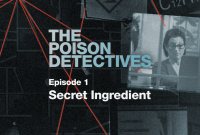Support strong Canadian climate journalism for 2025
While Diane Cotter was trying to figure out if something in her firefighter husband’s gear caused his prostate cancer, a lawyer several states over was zeroing in on the same chemical. In Ohio, Rob Bilott, a corporate lawyer who typically advises and defends big companies on environmental issues, was on a quest to uncover what was killing a rancher’s cattle. While he didn’t think he was the right fit for the investigation, he’d promised his grandmother he would help the rancher.
“You know when he first was telling me that he thought there was something going on, something nefarious between the company that owned the landfill, the Dupont chemical company and the regulators, you know, the State of West Virginia and/or the U.S. EPA, and all of this was being covered up, I had a really hard time actually believing any of that,” Bilott said.
The rancher believed his cattle were dying after drinking water in a nearby creek that was next to the landfill. And he had videos. Once Rob saw the videos of the foamy creek and sick and dying cattle, he thought it was a case of a company dumping too much waste — more than was allowed by their permits. He thought he could look at the permits, identify the substance in the water and get the company to stop or reduce the waste dump.
“There were permits. There were limits on how much you could discharge. And those permits had identified all these hazardous, toxic, regulated materials," said Bilott.
The company, Dupont, wouldn't co-operate, so Bilott sued. And when he got internal company documents as part of his lawsuit, he was introduced to the same chemical Diane heard about from environmental activist Erin Brockovich — PFOA. PFOA is one chemical of the PFAS family, which stands for per- and polyfluoroalkyl substances. And that chemical was not on any regulatory list.
“We found out there was this unregulated chemical in the landfill, which changed our entire focus and, you know, led us to really realize that that was really the issue,” said Bilott.
That was the beginning of a 20-year court battle with Dupont and efforts to get the regulator, the Environmental Protection Agency (EPA), to pay attention.
“Digging into the documents, starting to get into the files and seeing what was really going on there changed my entire perception, not only of what was happening at that particular site but my entire perception of environmental law as I knew it in our entire legal system. Our regulatory system, the way science is generated, just opened my eyes to things I had never been aware of before,” said Bilott.

Listen to Episode 2 of The Poison Detectives wherever you get your podcasts. If you like what you hear, help others find us by leaving a five-star rating and a comment.






Comments